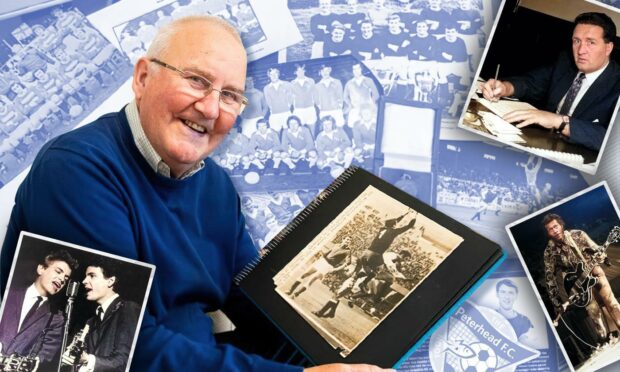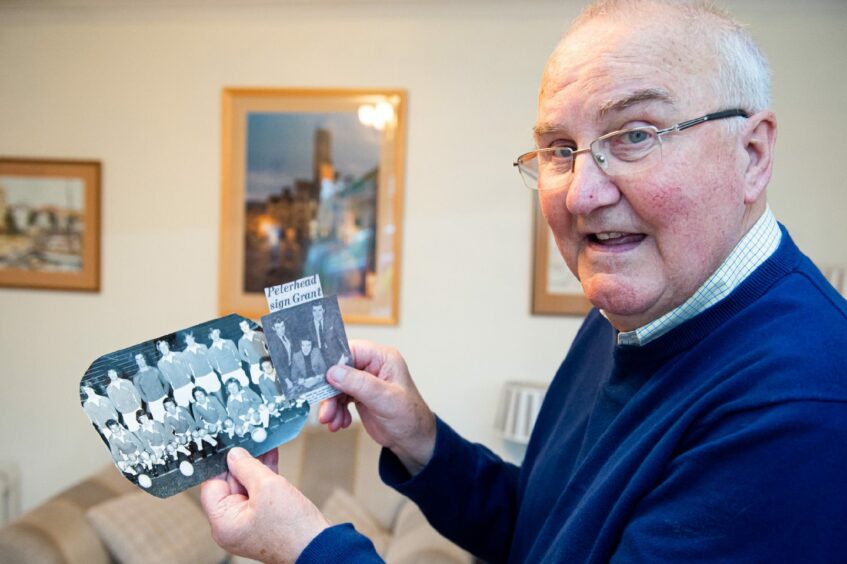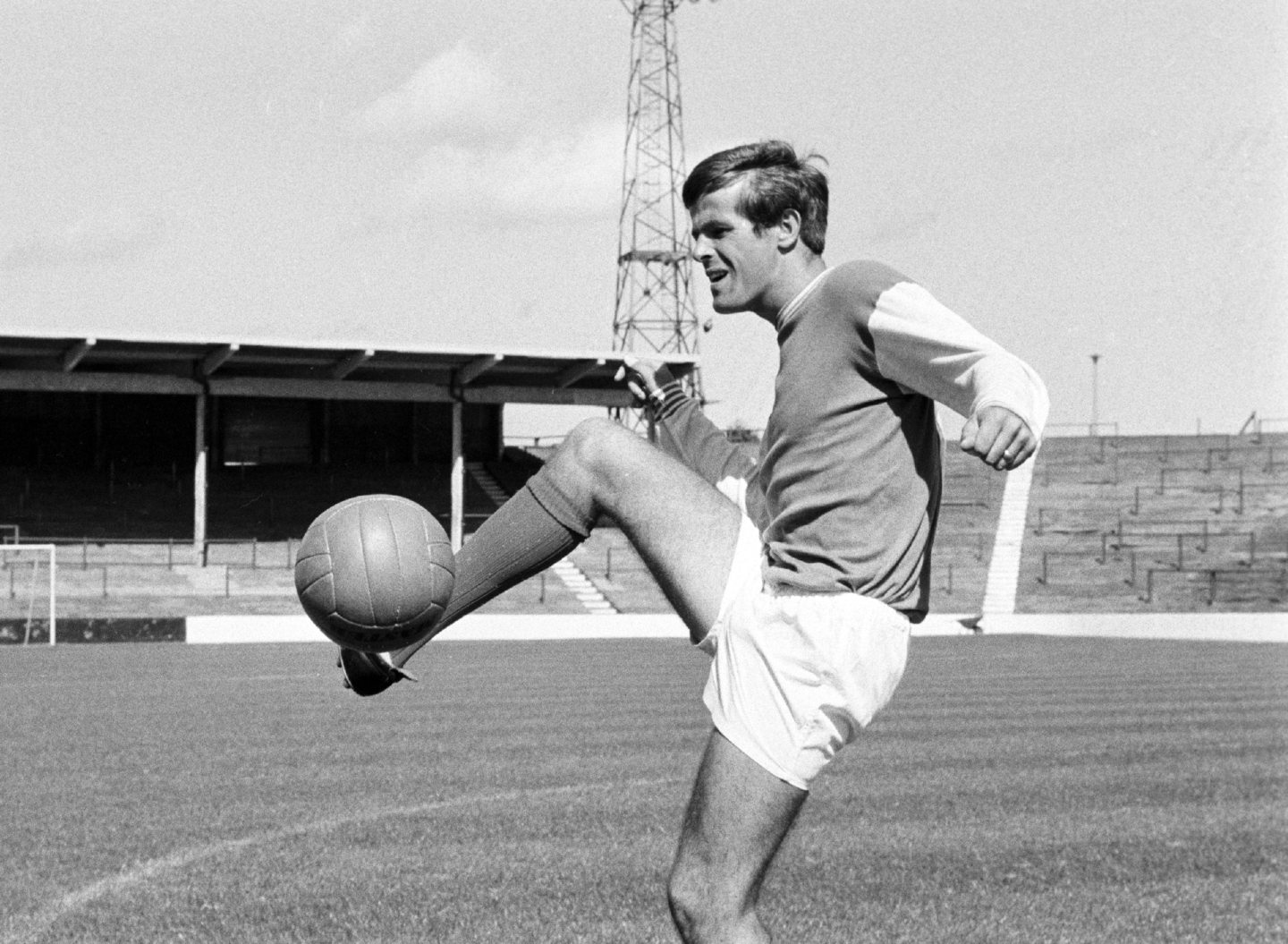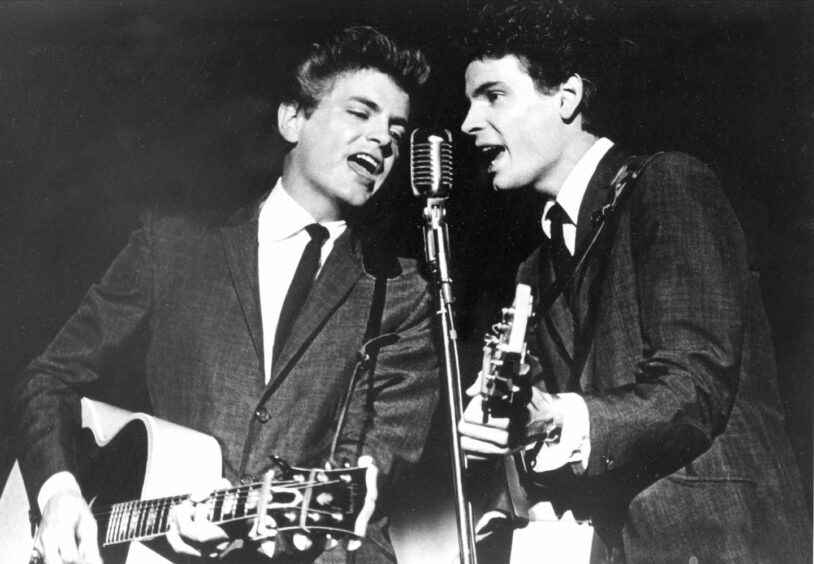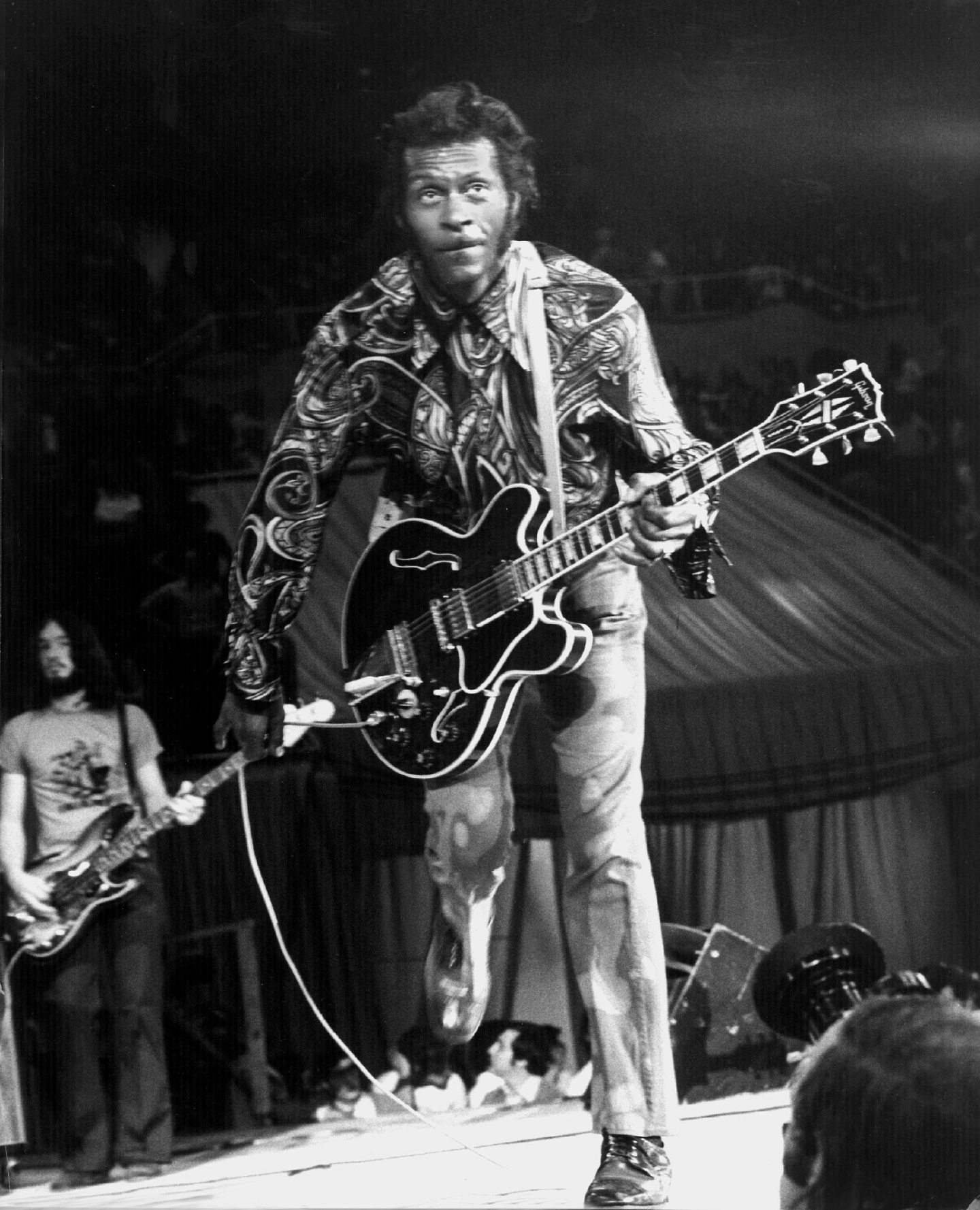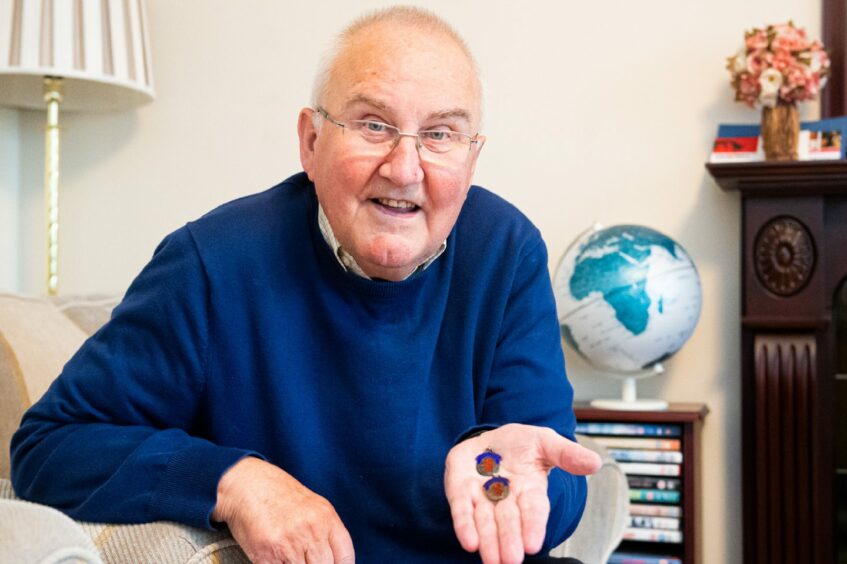He’s a man whose topic of conversation switches merrily from meeting Chuck Berry and surviving a riot in Canada to moving to the north-east and forging a strong bond with Peterhead FC.
Interviewing footballers these days can often be a grim affair.
The chances are they have been sent on a media training course, which means they can usually spot a banana skin quicker than Laurel & Hardy and rarely stray into anything remotely controversial.
But Colin Grant, a chap whose CV encompasses everything from being signed by the late, great Jock Stein to lifting the Scottish Junior Cup with Linlithgow Rose and helping Aberdeen unearth a string of precocious pearls in the early 21st Century, has the sort of natural bonhomie that makes him such compelling company.
Ever since he pitched up in the Blue Toon, the 77-year-old has worn more hats than Audrey Hepburn – as player, manager, vice-chairman and chairman (he’s now in the process of becoming their historian) – while he was also a pivotal figure in orchestrating the former Highland League club‘s elevation into the Scottish national structure.
As somebody with an endless stream of anecdotes and opinions, it’s hardly surprising that Colin has derived delight from creating a book that commemorates the 130th anniversary of Peterhead – and when he opened up his Ellon home to us, he was in rollicking, rumbustious form as he talked about his football life.
C’mon, let’s grab our tickets and jump aboard!
From the outset, at the start of the Swinging Sixties, Colin was one of those have-boots-will-travel individuals who thrived in many different environments.
He was spotted by the Easter Road club, who were managed by Stein, prior to his move to Celtic, and the deal was straightforward: as soon as Linlithgow Rose were knocked out of the cup, that would be Colin’s cue to join the professional ranks.
But, as Michael Caine might have said, they only went and won the bloody thing, which delayed the youngster’s departure for all the right reasons.
And, even now, he speaks admiringly of some of the people he met during his time in Leith, not least Pat Stanton, the ebullient former internationalist.
Legends loomed large in his life
He told me: “My early memories of training with Hibs – as a Linlithgow Rose player – in the 1964-65 season was how terrific it was to be full-time and have the chance to play in practice matches with international players such as Pat Stanton and Peter Cormack.
“I’m certain that if Pat – the best player I ever worked with – had played for Celtic earlier in his career, he would have gained more than 50 caps for Scotland (instead of just 16).
“Cormack went to Nottingham Forest and then moved on to Liverpool in the Kevin Keegan era and he won a stack of trophies with them, including two league and Uefa Cup doubles and an FA Cup during his illustrious time at Anfield.
“These were two great Scottish players who were wonderful professionals and I tried my best in the early days at Easter Road to watch and learn from them in the way they went about their business.
“As it turned out, it was Cormack getting injured in March 1966 that enabled me to make my debut against Hearts at Tynecastle in the Scottish Cup.
We fled for our lives to the dressing room, even as we were being chased by the Cagliari supporters.”
Colin Grant
“Opponents I remember maybe not quite so vividly were John Greig of Rangers and Doug Smith, the centre half at Dundee United.
“They were completely different kind of players, but both of them were 100% effective for their clubs.”
Colin fitted smoothly into the Hibs firmament with Bob Shankly replacing Stein after his exploits at Dundee, which earned him a place in the Dens Park Hall of Fame.
And at the height of Beatlemania, he and his fellow Hibees savoured a taste of rock ‘n’ roll exuberance and fan idolatry when they travelled to North America in 1967.
This was part of yet another attempt to sell football to a major audience in the United States, but while it proved a transient phenomenon, Colin has plenty of contrasting memories from that Summer of Love – and occasional hostility.
He said: “The Hibs tour of Canada and USA was an unbelievable experience for many reasons. We were based in Toronto and played as Toronto City.
“Off the park, we stayed in the Royal York Hotel and, in the basement lounge every Sunday night more than 200 local patrons would turn up for visiting pop artists.
“As invited guests, we were sometimes introduced to the audience and we met The Drifters, The Mamas and the Papas, and the Everly Brothers, who were all big stars at the time and recorded scores of hits.
“I recall Don Everly, when we said we were from Edinburgh asking: ‘Is that the quaint little place with the castle on the hill?’
“We also met Chuck Berry on a flight to Chicago and he was a real character. Happy days indeed.”
However, there was more trouble than he and Hibs would have wanted when Colin was the unwitting catalyst of serious disturbance at one of the matches.
He said: “Toronto has a big Italian sector and I’ll never forget the time we met Cagliari and, with 15 minutes remaining, the score was tied at 1-1.
“I had just come on as a substitute and, after we took a quick free kick, I scored with a neat finish with my first touch of the ball.
“The Italians went mad, saying it was never a free kick in the first place, and the ball was moving and they were raging.
“Well, to cut a long story short, there was a pitch invasion, and the referee was attacked and injured.
“We fled for our lives to the dressing room, even as we were being chased by the Cagliari supporters.
“Needless to say, the match was abandoned after all that happened. The result stood, but I don’t recall the punishment that Cagliari received.
“But it basically boiled down to: ‘Grant’s goal caused a riot”.
The north-east offered a new challenge
Colin has never been a person to engage in regrets or thoughts of what might have been. He seems to have relished all his myriad adventures and football is in his DNA.
He freely admits that when he arrived in the north-east of Scotland with his wife, Joy, and sons, Colin jnr and Mark, after a spell with Chelmsford, in 1974, he could not have told you anything about Peterhead or even where it was located on the map.
But he has amply made up for that during the last 47 years, fulfilling all the aforementioned roles for an organisation that now means the world to him.
He told me: “After signing and playing a few games, I could see that if we were to become one of the better Highland League teams, then a few things had to change.
“One was for all the players to train together. When I arrived, half the team came from Peterhead and surrounding areas and the other half came from Aberdeen.
“They also trained together just once a week and the team was also picked by the committee. But the following year I was appointed manager and things changed.”
They certainly did. And, during the next quarter of a century, Peterhead made the transition from the Highland League to the national structure and gained the chance to lock horns with the same clubs whom Colin had tackled in his own playing career.
His Stakhanovite efforts and tireless enthusiasm didn’t go unnoticed by others in the region. And definitely not 20 miles away in the Granite City.
Colin marvelled at the achievements of the Dons during the early 1980s and, as a proud Scot, was thrilled that Aberdeen FC enjoyed such unprecedented success.
But matters had changed by the dawn of the 21st Century and he was among the people recruited to help implement a transformation in their fortunes.
As he said: “In 2004 I got a phone call from Chic McLelland at Pittodrie to go in for a chat and a cup of tea.
“He explained that the club wanted to improve their scouting system in the whole of Scotland and asked if I would be interested in heading it up.
“The answer was yes and I worked alongside Lenny Taylor and Chic and later on, Neil Simpson – in Aberdeen – and Peter Weir in Glasgow.
There were diamonds in these mines
“We increased our number of scouts from four to 12 in the next 18 months. Aberdeen City, the North East, Angus, Elgin, Edinburgh and Glasgow were all eventually covered and it proved fruitful.
“Players who came through the system in different age groups included Scott McKenna, who was scouted in Kirriemuir and then sold for £3 million to Nottingham Forest.
“There were plenty of others, such as Bruce Anderson, Connor McLennan, Dean Campbell, Calvin Ramsay and Jack McKenzie, and we signed a few other players who have since moved on and are playing regularly with other clubs.
Did Joe get a proper chance at Pittodrie?
“You can add to the list somebody who I think never got a fair crack of the whip at Pittodrie and that was Joe Shaughnessy. He was signed after I saw him play in the Galway Cup tournament in Ireland.
“He eventually went to St Johnstone for a few seasons and was their captain and their player of the year twice before moving on to St Mirren. He was a really good pro.
“But football is all about opinions, isn’t it. And we all have different ones.”
Colin Grant has never taken a backward step in his existence. And he’s still passionate about his pursuit and about Peterhead.
His book should be a page-turner when it’s published next month.
